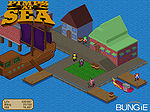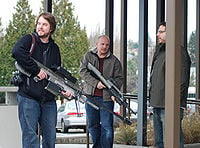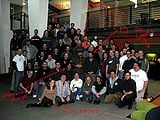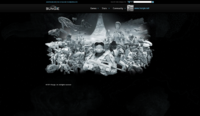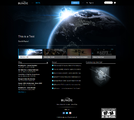Bungie
From Halopedia, the Halo wiki
| Bungie, Inc. | |
|---|---|

| |
| Company information | |
|
Date founded: |
1991 |
|
Founder(s): |
|
|
Leader(s): |
|
|
Parent company: |
|
|
Headquarters: |
Bellevue, Washington, USA |
|
Website: |
|
| Development information | |
|
Halo titles developed: |
|
|
Other notable games: |
|
| “ | Per Audacia Ad Astra | ” |
Bungie, Inc. (formerly Bungie LLC and Bungie Software Products Corporation prior to its emancipation from Microsoft) is a video game developer founded in 1991 by Jason Jones and Alex Seropian.
History[edit]
Founding[edit]
- "The culture of Bungie was pretty simple. It was just a bunch of college kids who wanted to drink beer and eat pizza and do amazing cool stuff in their basements."
- — Chris Butcher
For much of the 1990s they developed a series of increasingly technically detailed first-person shooter (FPS) games for the Macintosh, the most famous being the Marathon series, following this with the acclaimed Myth tactical-combat series for both the Mac and Windows. Bungie games were particularly well-loved by players due to their complex back stories which often left more mysteries unexplained than revealed.
In 1997, Bungle Studios established Bungle West, a studio in California. However, the studio didn't last long and was shut down in 2000. Bungie West's only game was Oni.
Creation of Halo series[edit]
- "Even through the Microsoft acquisition, Bungie’s purpose is not to make money for Microsoft and support the platform. Instead, Bungie’s purpose is to make great stuff like video games."
- — Chris Butcher[1]
In 1999 they announced that their next product was a return to the FPS genre, with a world-beating physics and AI system, to be known as Halo and to be released at the same time on both the Mac and also Windows. On June 19, 2000, Microsoft announced that they had acquired Bungie Software and that Bungie would become a part of the Microsoft Game Division (subsequently renamed Microsoft Game Studios) under the name Bungie Studios. The original versions were soon delayed and the game was re-purposed for the Xbox, with the Mac and Windows versions only shipping two years later when it was no longer the renowned product it would have been in about late 2000. The Xbox version of Halo received the Game of the Year and Console Game of the Year awards for 2002 from the Academy of Interactive Arts & Sciences, is known as a system seller and as of 2004 is still a videogame bestseller. Halo: Combat Evolved has been one of the most critically acclaimed games over the last three years, and its sequel Halo 2 has been called the 'most anticipated game of all time' by IGN Xbox.
End of partnership[edit]
- "Independence was the only thing that was going to be able to allow us to do what we wanted to do."
- — Pete Parsons
On October 5, 2007, Bungie and Microsoft announced an end to their partnership, effectively making Bungie an independent company once again, now titled Bungie LLC (limited liability corporation). The Halo Intellectual Property (IP) remains with Microsoft. Bungie employees have mentioned that there have been 'few noticeable changes' after the split.[2]
Their offices were originally based in Chicago, Illinois. After Microsoft's acquisition, they moved into the Microsoft Campus at Redmond, Washington. They have more recently moved to Kirkland, Washington.[citation needed]
New partnership[edit]
- "We are moving on. We're building something new, something totally different."
- — Eric Osbourne
On April 29, 2010, Bungie entered an exclusive 10-year partnership with Activision which will have exclusive, worldwide rights to publish and distribute all future Bungie games based on the new intellectual property on multiple platforms and devices. Bungie will remain as an independent company and will continue to own their intellectual property.[3] On June 30, 2011, Bungie announced "Bungie Aerospace", a platform to help small, independent mobile or social game developers launch their games.[4] On January 10, 2019, Bungie announced that they had parted ways with Activision, with the intellectual property rights to the Destiny franchise transferring to Bungie.[5]
Purchase by Sony[edit]
On January 31, 2022, Bungie was acquired by Sony Interactive Entertainment for $3.6 billion. Bungie intends to continue self-publishing cross-platform games.[6][7]
Bungie Mythos[edit]
- "Some of you may be wondering - "What's up with this unhealthy obsession with the number 7?" This page offers some insights."
- — Luke Smith[8]
Bungie, like many production companies, puts references to older games in newer games. Most well known of this is the connection between the Marathon universe and the Halo universe, which share a great deal of similar names and themes (see List of Marathon references in Halo).
Another interesting fact about Bungie is their use of the number seven. Many of these are more obvious than others, including 343 Guilty Spark (7 x 7 x 7 = 343), Pfhor Battle Group 7, and their official fan club, the 7th Column, but some of these are amusingly subtle: the Marathon colony ship was a hollowed out Deimos - first discovered in 1877 and first photographed in 1977.
Bungie as a company has developed its own complex and diverse mythology in addition to that in their games. Several of these include:
- The 7-Steps Plan for World Domination.
- The snack food Tijuana Mama.
- The decapitated head of a dog named Ling-Ling (Step Five in the World Domination plan).
- The entity that resides in their server is named Disembodied Soul.
- The chronically drunk and aggressive webmaster of Bungie.net (Known for dressing as a gorilla with a floppy yellow cowboy hat, as well as disappearing for months on "HTML research missions" and answering the E-Mails of grammatically impaired fans).
- A cheap absorbent toy fish called the Soffish.
- The Cup, the prize at the Bungie Winter Pentathlon (A tradition has emerged that the losing team, out of envy, steals the cup rather than let the winning team touch it. In fact, several Bungie employees doubt the actual existence of The Cup, as it has been stolen and hidden so many times they have never laid eyes on it).
- Bungie Day, a mock holiday Bungie created to celebrate the number seven.
Offshoot companies[edit]
Many of Bungie's employees have left the company to form their own studios. Double Aught was a short-lived company comprised of several former Bungie team members, founded by Greg Kirkpatrick. The company helped Bungie develop Marathon: Infinity, the last game in the Marathon series.[9]
Wideload Games, creator of Stubbs the Zombie in "Rebel Without a Pulse", is another company that came from Bungie; It is headed by one of the two Bungie founders, Alex Seropian, and 7 out of the 11 employees previously worked at Bungie. Other companies include Giant Bite, founded by Hamilton Chu (former lead producer of Bungie Studios), and Michal Evans (former Bungie programmer), and Certain Affinity. Founded by Max Hoberman (the multiplayer design lead for Halo 2 and Halo 3), the team of nine includes former Bungie employees David Bowman and Chad Armstrong (who later returned to Bungie) as well as folks from other developers. It collaborated with Bungie in releasing the last two maps for Halo 2.[10]
Games[edit]
Released games[edit]
- Gnop! (1990)
- Operation: Desert Storm (1991)
- Minotaur: The Labyrinths of Crete (1992)
- Pathways into Darkness (1993)
- Marathon (1994)
- Marathon 2: Durandal (1995)
- Super Marathon (1996)
- Abuse (Macintosh port) (1996)
- Marathon Infinity (1996)
- Weekend Warrior (Publisher) (1997)
- Myth: The Fallen Lords (1997)
- Myth II: Soulblighter (1998)
- Oni (2001)
- Halo: Combat Evolved (2001)
- Halo 2 (2004)
- Halo 3 (2007)
- Halo 3: ODST (2009)
- Halo: Reach (2010)
- Destiny (2014)
- Destiny 2 (2017)
Cancelled projects[edit]
- Mosaic (cancelled in early 1994)
- Monster Hunter (cancelled in early 2002)
- Phoenix (cancelled in late 2002 or early 2003)
- Gypsum (cancelled in June 2003)
Bungie Employees[edit]
- Main article: List of Bungie Staff
Notable Bungie employees include:
|
|
Trivia[edit]
- Over at Bungie.net, there is a forum thread investigating 'Arete Seven', which is quite possibly Bungie's real name while Bungie is just their public name.
- Bungie employees have said that "Bungie" is a punchline to a really dirty joke as an excuse to get out of conversations before. At one time Alex Seropian was quoted saying it's named Bungie because it sounded fun.[11]
- Bungie accepts resumes to the Bungie.net website via an email on the "Get Hired to Get Fire" page to work at the company and the flaming chestpiece is also given out to the new members.
- In Matchmaking, Bungie employees feature the distinct Bungie logo beside their gamertags in order to distinguish themselves from the lowly "Bungie employee impersonators" in Pre-Game Lobbies.
- In the Halo universe, there is an engineering firm named Bungie Motor Works.
Gallery[edit]
The Bungie team, with Peter Jackson.
Sources[edit]
- ^ Edge Online: Inside Bungie
- ^ halo.bungie.org: Microsoft And Bungie Studios To Evolve Relationship
- ^ Bungie.net: NON FACETE NOBIS CALCITRARE VESTRUM PERINÆUM
- ^ Bungie.net: Bungie Aerospace
- ^ Bungie.net: Our Destiny > News | Bungie.net
- ^ Bungie.net: BUNGIE JOINS SONY INTERACTIVE ENTERTAINMENT > News | Bungie.net
- ^ Bungie.net: Destiny 2: Our Shared Vision > News | Bungie.net
- ^ Bungie.net: Bungie Day Tribute
- ^ Bungie History: The Juggernougat
- ^ Bungie.net: New Halo 2 Maps Revealed!
- ^ Marathon.bungie.org: The Marathon Scrapbook

